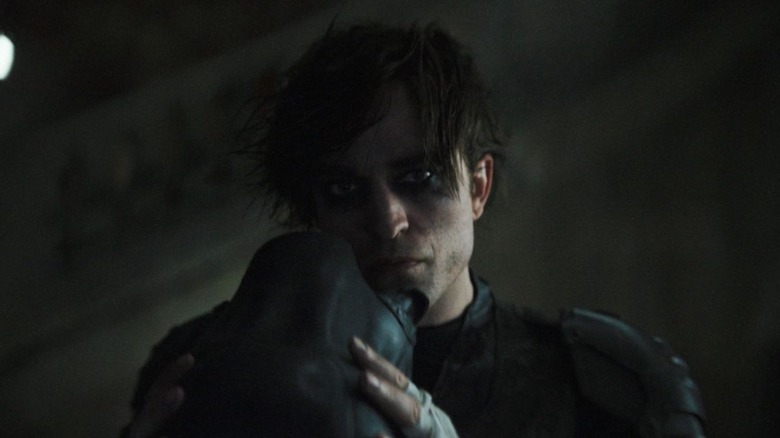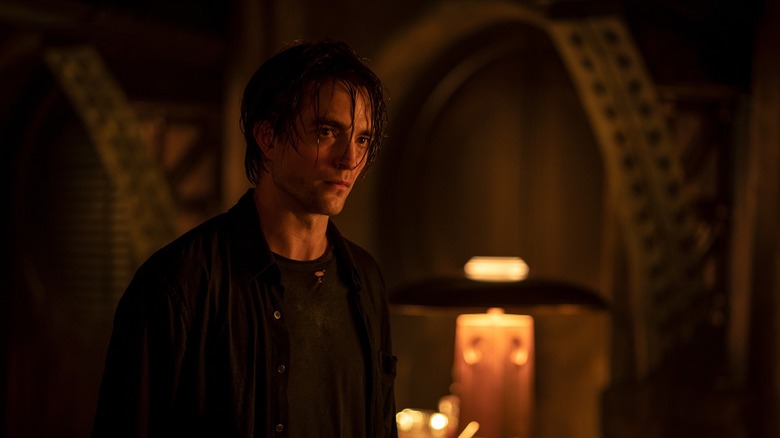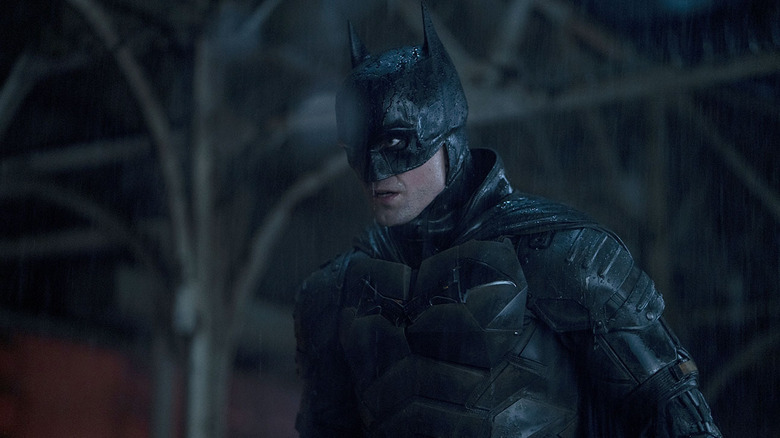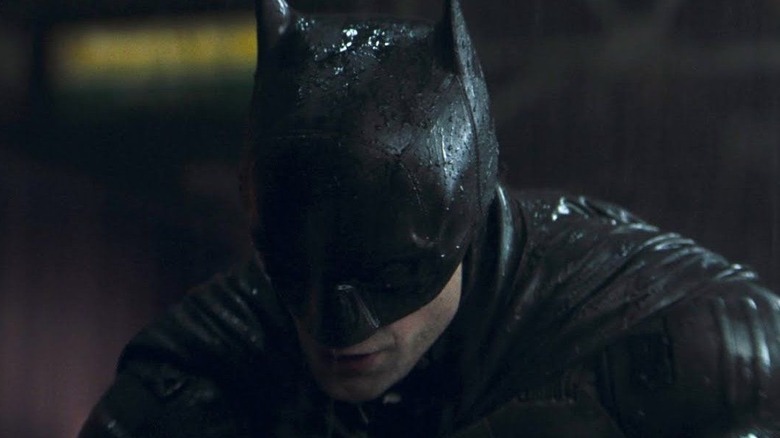Robert Pattinson's Batman Is The Most Miserable Caped Crusader Yet, And That's Why He's Perfect
Never was there a Batman filled with as much woe as Robert Pattinson's Caped Crusader in "The Batman." Granted, a dark and brooding countenance is part and parcel with Batman, as evidenced by his tragic origins (which I don't think I have to recount for you), his fondness for shadows and dark clothing, and his edgy nicknames like "The Dark Knight."
But all of this was always offset with the Bruce Wayne persona, the jocular and dashing playboy whose failed romantic relationships sometimes made their way over to the Batman side of things. Batman might have a reputation for brooding, but he was also a lover, an adept fighter, a capable detective, a borderline genius. Oftentimes, particularly in the comics or animated series, Batman's capacity for genius appears to transcend human limitations — in part, it seemed, to raise him to an equal (maybe even higher) level with the superpowered titans of the Justice League. His greatest vulnerability, his humanity, was his strength; overcompensating for his lack of powers with a near-superhuman intellect and sheer force of will. Batman, maybe even more so than the aspirational superheroes like Superman and Wonder Woman, is the ultimate superhero fantasy. You can be Batman, too, if you have the willpower and the resilience (and the money).
But somewhere in the fantasy, Batman lost that relatability. It may seem strange to think that once upon a time, Batman was the "relatable" hero when we've got our Peter Parker's and our Kamala Khan's, but 80-plus years ago, Batman was the closest to it. We've had our brushes with relatability onscreen — Batman and his romantically-inspired existential crisis in "Mask of the Phantasm," everything Michael Keaton did in his "Batman" movies. But we finally have our perfect relatable Batman for our times with Robert Pattinson's miserable, socially awkward, self-loathing Caped Crusader.
Warning: spoilers ahead for "The Batman."
Darkness, no parents
There's no mistaking how unapologetically noir "The Batman" is — from the moody "Se7en"-inspired aesthetic, to the wide-reaching conspiracy that finally allows Batman to live up to his "World's Greatest Detective" moniker, to the grungy voice-over that Pattinson practically growls in the opening minutes of the film. "They think I'm hiding in the shadows waiting to strike, but I am the shadows," Batman narrates as he emerges, boots clanking on the ground, to fight a group of goons.
It's so dark! It's so angsty! It's grim almost to the point of parody. But that's what makes it so great — Batman's many voiceovers across the course of "The Batman" feel like the scribblings of a tortured teen, and it turns out, they kind of are: they're revealed to be entries from Batman's journal that he pours his thoughts into every night — updates of his nighttime ventures with a sprinkling of poetry about "darkness."
Paired with his greasy dark hair that hangs in a curtain over his sallow face, Pattinson's Bruce Wayne is all rage and emotion, none of that sharply honed intellect that Batman would become famous for. The somber notes of Nirvana's "Something in the Way" that play over the course of the film seal it: this Batman is a wounded soul who would rather stew in his grief over his dead parents than go to therapy.
The hyper-masculine hero we think we deserve
Throughout his history, Batman has long been a figure of ideal masculinity — one with bulging muscles, a James Bondian way with the ladies (frequently given an extra layer of tragedy to lend him some depth), and razor-sharp instincts and smarts. He turned himself into a human weapon, one that he wields with precision and intent.
Pattinson, while muscular and toned, is not the hulked-out ubermensch of the comics, nor even of recent Batmen like Ben Affleck or Christian Bale. Honestly, he looks like he could keel over any second were he not so driven by his own quest for vengeance. He lumbers through Gotham wearing hefty body armor that weighs him down almost as much as his grief, and he fights with the desperation of a man on the edge. As for his way with women, Pattinson's Batman barely seems to be able to string more than a few sentences together whenever he's around Zoe Kravitz's Selina Kyle, at least when it doesn't have to do with the mystery he's investigating. While Selina graciously reads his silence as mystery, we all know what it really is — we've been reading his diaries — the Batman is a socially awkward goober.
The sad Bat we need right now
But, you might protest, Batman is cool! He's badass! He's edgy! And yet, Pattinson's take is not untrue to the character at all — I'd argue that he's taking what Michael Keaton did with his "sitting in the dark waiting for the Bat signal to light up" Batman and running with it — but an early and essential facet of the character.
Living as a recluse at the top of Wayne Tower, this Batman doesn't even bother to put up the pretense of being extravagant billionaire Bruce Wayne — in his rare public appearance, people are mostly intrigued to find out who this mystery billionaire orphan truly is, before being disappointed when he brushes them off. Pattinson's version yet hasn't figured out his Bruce Wayne-Batman dual identity, fitting for the character's "Year Two"-inspired mindset. It's not until he sees beyond his own angst and sees the suffering of others, and the suffering that people connected to him played a part in inflicting, that he can start to move beyond this Sad Boy version of Batman. Sad Batman plays a pivotal part in his arc in "The Batman," in which he learns that the only way he can exact real change in Gotham is by becoming more than a symbol of fear, but a symbol of hope.



